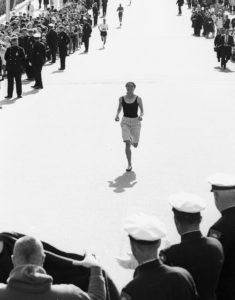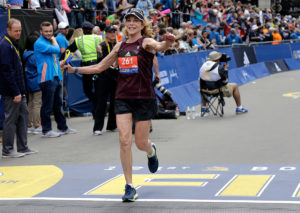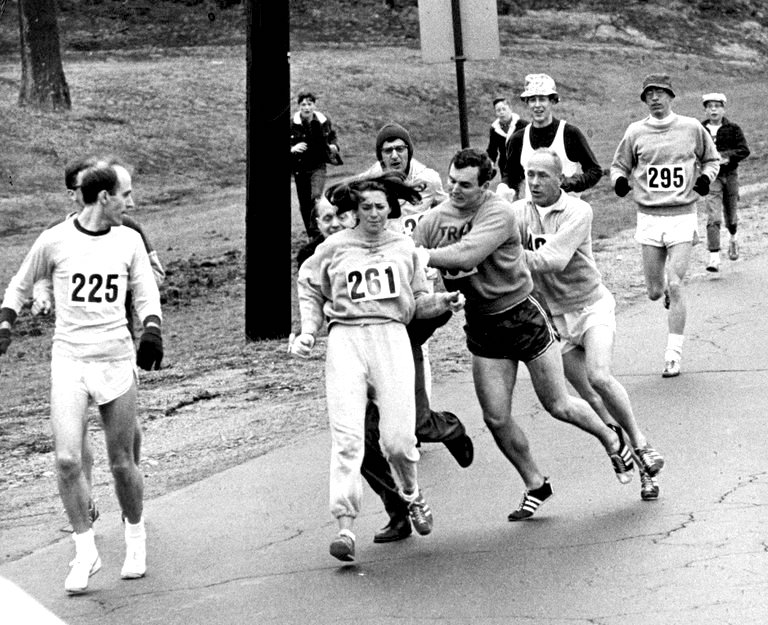On Monday, April 17, 2017, K.V. Switzer participated in the Boston marathon for the second time at age 70. She was wearing the same number that she wore in 1967. The name “K.V. Switzer” hid the gender of Katherine Switzer, the first woman to officially run in the Boston marathon, previously an all male race.

photo courtesy of Wikimedia Commons
Roberta Louise “Bobbi” Gibb, ran the Boston Marathon in 1966, and was the first woman to run the entire marathon, although she snuck in. “If I can overturn this false belief about women, I could throw into question all of the other false beliefs about women that have been used to keep women in virtual subjugation, for centuries. It was at that point that I realized that my run was going to be a social statement,” said Gibb in a story for WGBH news. Gibb wore a hoodie and her brothers shorts, jumping out from a bush near the starting line, waiting to jump in with the middle of the pack in an effort to hide herself as best as possible. Men saw her, suspecting that she was a woman based on her physical features as she ran next to them. Gibb reflected, saying that she thought the other men would try to push her out of the race because of her gender. Instead, they responded saying that they wished the women in their lives would also run in the race. Gibb told the men runners that she “was afraid if [she] took the hood off, and they see that [she was] a woman, they [would] throw [her] out.” They responded saying, “We won’t let them throw you out.”
As more people began to notice that she was a woman running, local news stations and the press covered her progress. The women at Wellesley waited for Gibb to run through the college campus, about the halfway mark of the race, cheering and screaming as they saw this inspiring woman passing through. One woman commented, saying, “Somehow we knew, that things were never going to be the same, after that.”
When she finished the race, the governor of Massachusetts came down to shake hands with Gibb. This picture headlined newspapers across the country the next morning. Gibb finished the race in 3 hours, 21 minutes and 40 seconds, ahead of ⅔ of the pack.
Currenty, Gibb still runs for an hour a day. She is now working on getting a sculpture of a woman along the marathon path.
In addition to Gibb, Switzer also broke gender norms and stereotypes, and smashed assumptions that held women as too weak to participate in marathons.
The race in 1967 became so well-known, not only for the fact that Switzer was the first women to run the Boston Marathon, but emphasised by the fact that a security guard during the 1967 race tried to physically remove her from continuing in the race. Although not a record, Switzer finished the race in 4 hours and 20 minutes. This year, at age 70, Switzer completed the race only a bit slower, finishing with a time of 4:44:31.
“The marathon was a man’s race in [1967]; women were considered too fragile to run it,” wrote Kathrine Switzer, 10 years ago, in an essay for the New York Times. Moving past this thinking, in 1972, women were finally permitted to enter the race. In fact, women’s marathoning has come quite a long way since 1967 when Switzer first ran the Boston Marathon. In 1984, women’s marathoning joined the Olympics, gaining even more popularity through runners like Grete Waitz.
“In 1967, few would have believed that marathon running would someday attract millions of women, become a glamour event in the Olympics and on the streets of major cities, help transform views of women’s physical ability and help redefine their economic roles in traditional cultures,” Switzer was quoted in the New York Times. Through marathon running, women’s strength and ability to compete alongside men has become clearer and more powerful. Today, more than 50 percent of marathon runners in the United States identify as women.
Switzer’s marathon career didn’t end in Boston. Over the years, Switzer has continued to break down stereotypes defining women’s ability to participate in sports and running, as she has competed in over 30 marathons. Switzer won the New York marathon in 1974, finishing in 3:07:29. She continues to work towards fueling a drive for more women to participate in the sport of running, with her organization, 261 Fearless, which is a running club for women.

photo courtesy of Wikimedia Commons
Switzer is still marathoning. She ran in the Boston Marathon this year, at age 70, Switzer also announced that she hopes to run New York this year as well. KK Switzer’s number, that she wore in both 2017 and 1967, was retired after the recent race. It is only the second number that the marathon has ever retired. Prior to her recent start, Switzer was given the honor of firing the gun to start off the women’s elite runners.
Switzer wrote about her legacy and past in pioneering, for The Times, “We learned that women are not deficient in endurance and stamina, and that running requires no fancy facilities or equipment. Women’s marathoning has created a global legacy.”
Through marathoning and sports women have broken gendered barriers. And through breaking barriers, women have defied assumptions. Although women have an incredibly long way to go to be recognized as equal, certain actions in the past, like those of Switzer have made a statement and proved that women can do all that men can.







